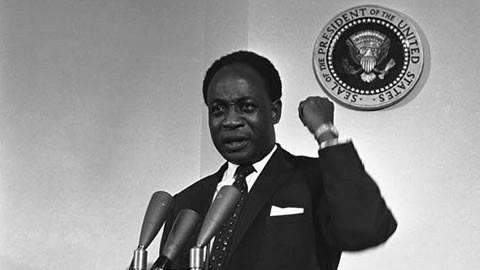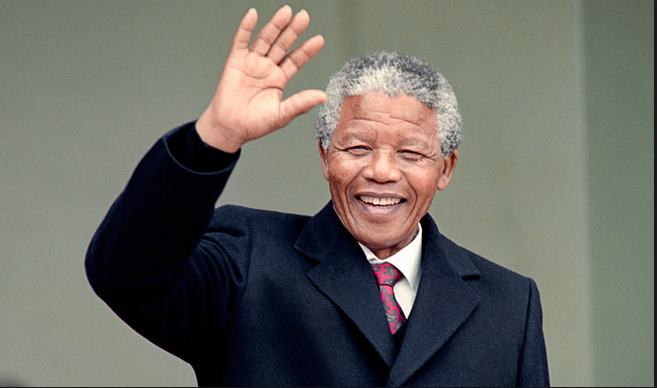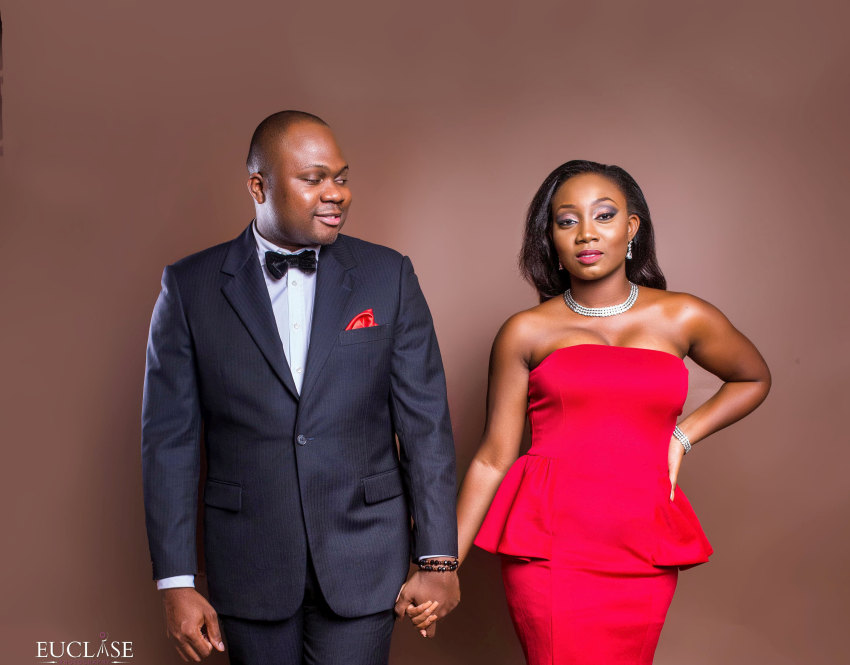On This day: February 12, 1951 Nkrumah was released from prison…

On February 12, 1951, the first Ghanaian government or cabinet, dominated by native Ghanaians was formed in the run up to independence on March 6, 1957.

While Nkrumah was being treated as a criminal in prison, crowds gathered daily in front of the James Fort chanting the Party’s songs/anthems, “There is Victory for US” etc. Nkrumah, on the other hand, was busy writing on sheets of toilet paper in darkness outlying the party’s strategies on the next level of the struggle, as well as rewriting the Party’s manifesto. Notwithstanding its opposition to the Coussey Constitution, the CPP changed its mind and contested the first general elections in the history of the Gold Coast on February 8, 1951. Not only did Nkrumah win the Accra Central constituency by obtaining 22, 780 votes out of registered 23, 122 voters, but also the CPP won a sweeping victory by pulling 39 of the 43 popularly elected seats. Subsequently, Nkrumah was released from prison on February 12, 1951 to become Leader of Government Business.
Shortly after the CPP victory in the 1951 election, the UGCC collapsed. So all along, “Kwame Nkrumah was the UGCC and the UGCC was Kwame Nkrumah.”
Nonetheless, on October 14, 1951, Nkrumah, while a Leader of Government Business, invited all the political parties (including J. B. Danquah and Obetsebi Lamptey) to join the CPP in a conference to plan a nation-wide campaign of Positive Action, should the British Government “rejects a motion for self-government now,” but none of them responded. In the meantime, due to pressures from Nkrumah, the Governor, on March 5, 1952 addressed the Legislative Assembly and declared that the Leader of Government Business should disappear from the constitution and be replaced by the office of Prime Minister. Accordingly, Nkrumah was elected by a secret ballot in the Assembly on March 10 to the office of Prime Minister. Not surprisingly, Dr. Danquah characterized it as “window dressing.”
The differences between Kwame Nkrumah political ideology and economic philosophy and those J. B. Danquah manifested during the 1951 Cocoa Marketing Board Amendment debate in the Legislative Assembly. While the CPP, led by Ohene Djan, argued for state control of the Gold Coast Marketing Board to generate revenue from the sale of cocoa to promote the development in the country (like the Adomi Bridge, Volta River project, Tema Harbor and township, Okomfo Anokye Hospital, democratization of education and health services, construction of the University of Ghana campus at Legon, Kumasi College of Technology (now KNUST), Medical School, road construction etc.), the Opposition, led by Dr. Danquah, opposed it saying that the bill was in violation of the full enjoyment of private property; hence, the property-owning political party (UGCC, GCP, NLM, UP, PP, NPP).
The 1954 and 1956 General Elections.
On June 10, 1953, Kwame Nkrumah tabled a motion in the Assembly on constitutional reform, popularly known as the “Motion of Destiny,” in which Nkrumah demanded self-government. This resulted in the 1954 general election on June 15, 1954, which the CPP won 72 out of the 104 parliamentary seats. The Ghana Congress Party (GCP), formed by Prof. Busia in May 1952, only won one out of the 104 seats. Dr. J.B. Danquah (also of the Ghana Congress Party) lost the parliamentary seat in the Central Akyem Abuakwa constituency. (Danquah’s election to the Legislative Assembly in 1951 was through the municipal/and electoral college, and not by popular vote.) Like the UGCC, Ghana Congress Party collapsed.
In 1954, the UN Trusteeship Visiting Team recommended that a plebiscite be held in the Trans-Volta under British rule for the people to decide whether they wanted a union with the imminent Gold Coast’s independence. Due to the 1948 Nkrumah Nation-wide tour, his United Gold Coast agenda, as well as the CPP campaign in the province, majority of the people voted to cast their lot with the new country Ghana. S.G. Antor (conceivably, one of the Founding Fathers) of the Togoland Congress strongly campaigned it.
That notwithstanding, the anticipated independence in 1956 as promised by the Van Lare Constitution was bludgeoned with the birth of the ethnocentric National Liberation Movement (NLM) in the Asante Region. Launched (amidst slaughtering a sheep, the firing of muskets and chanting Asante war songs) by Bafour Osei Akoto with Prof. Kofi Abrefa Busia as its leader, the NLM accused the CPP government of using the cocoa farmers’ money to develop the coastal region or Colony. Thus, the Asante “cocoa farmers would be better off if they would manage their own internal affairs.” But the real reason behind the launching of this anti-political party movement was to provide another opportunity for the opposition parties (NLM, NPP, Togoland Congress etc.) to punctuate the attainment of Ghana’s independence under Kwame Nkrumah and his CPP government that year. In doing so, they (including J. B. Danquah, Obetsebi and other members of the defunct UGCC and GCP) demanded federalism by boycotting all talks, forums, meetings etc. The British government yielded to the intrigues of the Opposition and decided to hold another general election in 1956 for the people to decide whether they wanted a “unitary government” or a “federal form of government.” In spite of the NLM terrorist acts, the CPP, again, won another decisive victory in the July 1956 election.
Prior to the election, Dr. Busia had written to inform the Governor that, “in accordance with the constitutional practice in the United Kingdom, the National Liberation Movement and its allies will expect Your Excellency to call upon Doctor K. A. Busia, their Parliamentary Leader, to form a Government should they win more than 52 seats at the election.” Yet after Nkrumah’s CPP won the 1956 general election, Prof. Busia produced another theory saying that no constitution would be acceptable unless it was “favored by a majority of the people of every region into which the Gold Coast” was divided.
In his July 13, 1959 letter to Mr. Brockway in London, J. B. Danquah said, “I was against any election as premature and favoured Constituent Assembly,” where the pre-ordained rulers would be selected to rule (see Historic Speeches of Danquah). To understand Danquah’s reason for disregarding the electoral process and disrespecting the CPP victories and Nkrumah’s government, we must go to the root of Danquah’s political ideology. Aside from being a “tame student of Kant’s moral philosophy” (Danquah, Vol. 1), Danquah (Busia included) echoed and practiced Edmund Burke’s ideology of rule by the preordained elite. Burke’s political philosophy was developed at Oxford University into an ideology that the elite is born to rule the world. Thus, it does society great harm, Burke reasoned, if the masses (affirming Aristotle’s views that the masses should have been slaves) are allowed to participate in governance by voting. So, since Kwame Nkrumah was a goldsmith’s son with some “NTAFO” (Northerners) in his 1951 government, Dr. Danquah remarked, and since the CPP was voted into power mostly by the “masses,” the Danquah-Busia camp considered the CPP government illegitimate and dangerous to the society; hence, it must be destroyed by violence.
In fact, Danquah’s elitism was manifested in his distaste and contempt for “this thing of masses,” whom he viewed as “only individuals” and dismissed their aspirations as “emotions.”
The Danquah-Busia Camp’s Style of Democracy.
1. On April 5, 1955, the Opposition led by Busia and Modesto Apaloo walked out of the Assembly, just after a Motion on a Select Committee to examine the whole question of the federal system of government had been seconded. In their opinion, the Select Committee, comprising some CPP parliamentarians or the “homeless tramp and jackals” (Liberator, March 1956), was incompetent to deal with national matters.
2. Bafour Osei Akoto and the chiefs in the “National Liberation Movement” did not want their movement to be called “Party,” since “party politics were contrary to the tenets of traditional rule.” Similarly, on March 14, 1956, Danquah and his brother Nana Ofori Atta II told a visiting parliamentarian delegation to Kyebi that “PARTY POLITICS is an alien political form which” had “created civil strife and violent dissension between father and son.” Accordingly, if the British showed no understanding, Akyem Abuakwa would secede from the country “as a sovereign and independent state with the only rival of the Ashanti country.”
3. During the Jackson Commission, Danquah categorically denounced the authority of the Kwame Nkrumah government saying that “the people of Akyem are not subjects to the laws of Ghana (Jackson Commission’s Report, 1958). So, his recourse was to do what?
4. Dr. Busia’s NLM referred to the CPP supporters in Asante as “those who belong to no family or clan, those who are strangers, not properly trained to appreciate the value of the true and noble Akan” (Liberator, December 20, 1955). A Party of “Founding Fathers?”
5. The Opposition led by Dr. Busia, refused to meet with Sir Frederick Bourne in Kumase, sent by the British government to resolve the impasse between the CPP government and Opposition. And when the government issued its constitutional proposal for the country’s independence in the April White Paper of 1956, again, the Opposition boycotted its proceedings. So, how would later-day apologists lump the Opposition leaders together with Nkrumah as “Founding Fathers?”
5. On November 20, 1956, leaders of the NLM and NPP sent a resolution to the Secretary for Colonies in London, demanding a separate independence for Asante and Northern Territories. Yesterday’s Secessionists, today’s Founding Fathers!
Terrorist Acts of the Danquah-Busia Camp.
6. . Dr. K. A. Busia and the NLM warned the British government in August of 1955 of grisly aftereffects, if the country attained independence under the CPP government. Hence, the Danquah-Busia camp resorted to the undemocratic methods and terrorist acts and bomb attacks to overthrow the democratically elected government of Kwame Nkrumah, before and after Ghana’s independence. Yesterday’s Terrorists, Today’s “Founding Fathers”!
7. On November 10, 1955, Nkrumah’s house was bombed while he was resting and working in his house with his secretary and others because of a terrible cold. Danquah-
Busia-Obetsebi Lamptey’s style of democracy!!!
8. On the day that the CPP reopened its regional office in Kumase after fourteen months of closure, Prof. Busia’s NLM drove a jeep past the crowd and fired shots into it and wounded several people; it also killed a pregnant woman. Earlier, Krobo Edusei’s sister had been shot dead as she was preparing food in the backyard for her children; while Edusei’s wife had survived a bomb blast. Yesterday’s Murderous, Today’s “Founding Fathers”!
9. On the eve of Ghana’s Independence on March 6, 1957, the Ewe Unificationists, led by S.G. Antor (Danquah’s buddy), formed themselves into a ragged guerilla army in Alavanyo and prepared for armed insurrection with homemade guns against the CPP government. The Governor-General sent troops to the region to put down the revolt. Yes, S. G. Antor (J. B. Danquah’s loyal buddy, an ally of Prof. Busia, and one of President Kufour’s heroes) by his (Antor’s) terrorist acts also passes to be one of the “Founding Father.”
Sabotaging Ghana’s Independence: Dr. Busia and the NLM.
10. On August 3, 1956, the Opposition leaders boycotted the constitutional debate tabled by the CPP government regarding Ghana’s independence. “Founding Fathers” indeed!
11. Again, when the Parliament formally opened after the 1956 general election to deliberate on Nkrumah’s Motion of Independence, Dr. Busia and the NLM, and NPP’s parliamentarians were absent. Reprehensible Saboteurs and not “Founding Fathers”!
12. When the British Governor, in his opening speech, introduced a Bill declaring that the Gold Coast would be a sovereign and independent State within the Commonwealth, Prof. Busia and the Opposition criticized the proposal saying that it was premature. Saboteurs and not “Founding Fathers”!
13. Before independence, Dr. Busia traveled to London to make a plea to the British Government to deny granting independence to Ghana, “because the country is not ready for parliamentary democracy.” He continued, “We still need you in the Gold Coast. Your experiment there [Gold Coast] is not complete. Sometimes I wonder why you seem such in a hurry to wash you hands off us.” What a Traitor!!!
Opposing and Attacking the Name Ghana and Flag for the New Nation
14. When the British Government conceded to Ghana’s independence on March 6, 1957, and Nkrumah chose for Ghana’s flag, Red for the blood of the martyrs, Gold for wealth, Green for the rich land and the Black Star in the center representing the freedom of Africans on the continent and in the Diaspora, Danquah-Busia camp opposed it.
15. The Danquah-Busia camp had previously associated themselves with the name Ghana, yet when Kwame Nkrumah proposed it (GHANA) as the name for the new nation-state, they not only opposed, but they also attacked it. How can saboteurs become “Founding Fathers?”
Given all that have been discussed above, how on earth can any living sane person lump Kwame Nkrumah together with the fictitiously labeled “Big- Six” and/or ex-UGCC’s Working Committee members etc., (who strongly opposed, condemned, sabotaged and distanced themselves from anything associated with Nkrumah, as well as bitterly decried him, bombed his house, terrorized members of his CPP, attempted secession from the country, and opposed the name, “Ghana” for the new nation-state and its flag, from 1948 to Ghana’s independence on March 1957) as “Founding Fathers?” Where were they on the dais where Kwame Nkrumah stood and declared the Independence of Ghana, followed by the National Anthem as the rising FLAG of Ghana was replacing the downward British flag on the eve of Ghana’s independence? Also, where were they in the banquet hall where all those who mattered assembled to celebrate Ghana’s independence? The answer? They were busy plotting to make the new nation-state ungovernable, and overthrow to the CPP Government by violence.
Source: Ghana History



